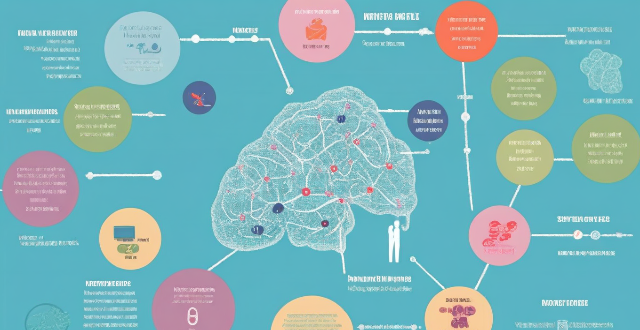Mindful Brain

How can I train my brain to stay focused for longer periods of time ?
How can I train my brain to stay focused for longer periods of time? There are several ways to improve focus and concentration, including increasing physical activity, improving sleep quality, eating a healthy diet, practicing mindfulness meditation, and learning new skills or hobbies. Here are some tips for each: - Increase Physical Activity: Exercise releases endorphins that can help reduce stress and anxiety, as well as improve blood flow to the brain. Aim for at least 30 minutes per day, five days a week at a moderate intensity (70-85% of maximum heart rate). - Improve Sleep Quality: Getting enough sleep is crucial for maintaining good mental health and improving focus. Aim for 7-9 hours of quality sleep each night by practicing good sleep hygiene and using a sleep tracking app. - Eat a Healthy Diet: A healthy diet can provide the necessary nutrients for brain health, including whole foods like fruits, vegetables, lean proteins, and healthy fats. Avoid processed foods, sugary drinks, and saturated fats. - Practice Mindfulness Meditation: Mindfulness meditation can improve focus and reduce stress by teaching you to be present in the moment. Try practicing mindfulness for at least 10 minutes each day. - Learn New Skills or Hobbies: Learning new skills or hobbies can stimulate the brain and improve focus. Choose something that interests you and commit to learning it regularly. Set aside at least 30 minutes per day to practice.

Does immigration policy contribute to brain drain in certain countries ?
Immigration policy can contribute to brain drain by offering attractive programs for skilled workers and students, providing better economic opportunities and living conditions, and catering to social and cultural factors. This results in a loss of talent for source countries but can also lead to brain circulation if individuals return with valuable skills.

How does exercise affect brain function and cognitive abilities ?
This article discusses how regular physical activity positively impacts brain function and cognitive abilities by improving blood flow, boosting neurotrophic factors, enhancing plasticity, and reducing inflammation. It emphasizes the importance of incorporating exercise into one's lifestyle for maintaining and enhancing cognitive health.

How can I stimulate my brain to generate new ideas ?
How to stimulate your brain to generate new ideas?

What are the benefits of physical activity on brain health ?
Physical activity has numerous benefits for brain health, includingPhysical activity has numerous benefits for brain health, including risk of dementia, including improved cognitive function, reduced risk of dementia, and increased overall brain volume. Regular exercise increases blood flow to the brain, delivering nutrients and oxygen to neurons, reducing inflammation and oxidative stress, and enhancing neural plasticity through increased levels of BDNF. Additionally, physical activity improves mood, reduces symptoms of depression and anxiety, and improves sleep quality. Incorporating regular exercise into your lifestyle can help maintain a healthy mind and body.

How does exercise improve cognitive function ?
Exercise plays a crucial role in enhancing cognitive function, including memory, attention, and problem-solving skills. It promotes brain plasticity, increases blood flow and oxygenation, reduces inflammation, and improves sleep quality. Incorporating exercise into your routine can be done through various activities such as running, swimming, or yoga. Start small and gradually increase intensity and duration, find enjoyable activities, incorporate mindful movement, make it social, set realistic goals, and consult with a professional if needed.

Why does poverty not only affect your wallet, but also hurt your brain? What is the scientific basis for this?

How can I incorporate mindfulness into my daily routine to improve my personal health ?
Incorporating mindfulness into your daily routine can improve personal health by increasing self-awareness and reducing stress. Techniques include starting the day with meditation and gratitude, practicing mindful eating, single-tasking, taking nature breaks, walking meditation, breath awareness, mindful listening, tech-free time, body scans, positive affirmations, mindful movement, evening reflection, wind-down routines, bedtime meditation, sleep journaling, comfortable sleep environments, digital detox before bed, guided sleep meditations, and ending the day with a gratitude prayer.

How can I make healthier choices when eating out at restaurants ?
The text offers a comprehensive guide on how to make healthier choices when eating out at restaurants. It outlines strategies such as planning ahead, starting with a salad, controlling portion sizes, choosing cooking methods wisely, being mindful of sauces and condiments, drinking water, not fearing special requests, and practicing mindful eating. These tips aim to help individuals maintain a balanced and healthy lifestyle while still enjoying dining out experiences. The key takeaways are the importance of moderation, making informed choices, and listening to one's body to avoid overeating.

How can mindfulness practices be integrated into sports psychology for improved focus and performance ?
Mindfulness practices can be integrated into sports psychology to improve focus and performance for athletes. Benefits include improved concentration, reduced anxiety and stress, enhanced self-awareness, and better recovery. Techniques such as breathing exercises, meditation, visualization, mindful movement, and journaling can be used by athletes to develop greater awareness of their thoughts, feelings, and surroundings. Incorporating these practices into training programs can help athletes stay calm under pressure, maintain focus during competitions, and improve overall performance.

What are some innovative approaches to incorporating physical activity into daily classroom routines ?
Incorporating physical activity into daily classroom routines is essential for student development. Brain breaks, movement stations, active learning games, outdoor experiences, and mindful moments are effective ways to promote physical health, cognitive abilities, social skills, and emotional well-being. Examples include stretching exercises, dance parties, yoga poses, math hoops, word cones, chair yoga, scavenger hunts, Jeopardy! relay races, spelling jump rope, nature walks, field trips, outdoor classrooms, breathing exercises, body scan meditations, and gratitude journaling.

Can sport-specific meditation or mindfulness practices improve performance and mental clarity ?
Sport-specific meditation and mindfulness practices can improve performance and mental clarity for athletes. These techniques offer benefits such as improved focus, reduced stress and anxiety, and enhanced recovery. Incorporating these practices into training regimens can help athletes achieve better results.

How does exercise impact memory and learning ?
Exercise has a positive impact on memory and learning by increasing blood flow, releasing neurotrophic factors, reducing inflammation, alleviating stress, and improving sleep quality. Incorporating physical activity into daily routine can enhance cognitive functions.

Are certain durations or intensities of exercise more beneficial for cognition than others ?
Exercise has been shown to improve cognitive function, memory, and mental health. Both short-term and long-term exercise can enhance different aspects of cognition. Moderate-intensity exercise is most beneficial for older adults, while high-intensity exercise may also be advantageous but should not exceed certain levels. Aerobic exercise, resistance training, and balance exercises all contribute to cognitive improvement. Individual differences should be considered when determining the optimal exercise regimen for cognitive enhancement.

How does exercise contribute to mental rejuvenation ?
Exercise plays a crucial role in mental rejuvenation by releasing endorphins, improving blood flow, enhancing neuroplasticity, reducing stress, improving sleep quality, facilitating social interaction, and boosting self-esteem. Regular physical activity can significantly contribute to improved cognitive functions, emotional stability, and overall mental well-being.

Is there a link between screen time and decreased attention span ?
In the digital age, excessive screen time has been linked to decreased attention span. Studies show that prolonged exposure to screens can lead to reduced ability to focus, shortened attention span, and impaired memory retention. The relationship between screen time and attention span can be understood through mechanisms such as dopamine release, fragmented attention, disrupted sleep patterns, and reduced physical activity. Research findings support these claims, with studies showing that children and college students who spend more time on screens have shorter attention spans and lower academic performance. However, there are ways to mitigate these effects by setting limits on screen time, practicing mindful usage, taking breaks, engaging in physical activity, and prioritizing sleep. By being mindful of our screen habits and taking steps to mitigate their impact, we can maintain healthy attention spans and overall cognitive well-being.

How does exercise influence the brain's chemistry related to emotions ?
Exercise significantly impacts brain chemistry, enhancing emotionalExercise significantly impacts brain chemistry, enhancing emotional neurotransmitters like doin, promoting neuroplasticity through BDNF, and boosting self-efficacy and social interaction. Incorporating enjoyable physical activities into daily routines can lead to improved mental health.

Are there any breathing techniques that can help reduce stress ?
Breathing techniques are a simple yet powerful tool for reducing stress levels and promoting relaxation. By practicing these techniques regularly, you can improve your overall well-being and reduce the negative effects of stress on your body and mind. Some effective breathing techniques for stress reduction include deep breathing, diaphragmatic breathing, alternate nostril breathing, and box breathing. These techniques help to increase oxygen flow to the brain, relax the body, balance the left and right hemispheres of the brain, and slow down the heart rate. Remember to focus on your breath and try to clear your mind of any distractions while practicing these techniques.

What kind of diet do celebrities follow for a healthy lifestyle ?
Celebrities often follow specific diets to maintain their health and appearance, including the Mediterranean, Vegan, Paleo, Keto, Intermittent Fasting, Juicing, Plant-Based, Clean Eating, DASH, and Mindful Eating diets. These diets offer various benefits such as weight loss, improved heart health, better digestion, and enhanced mental clarity. Celebrities like Jennifer Aniston, Beyoncé, Matthew McConaughey, Halle Berry, Hugh Jackman, Salma Hayek, Ellie Goulding, Gwyneth Paltrow, Queen Latifah, Adele, and Jennifer Lawrence have incorporated these diets into their lifestyles.

How can women maintain a healthy weight through proper nutrition ?
Maintaining a healthy weight is crucial for overall well-being, and proper nutrition plays a vital role in achieving and maintaining it. Women can maintain a healthy weight through proper nutrition by following these tips: 1. Eat a balanced diet consisting of whole grains, fruits, vegetables, lean proteins, and healthy fats. 2. Control portion sizes to prevent overeating. 3. Eat regularly throughout the day to maintain consistent blood sugar levels and prevent overeating. 4. Drink plenty of water to stay hydrated and prevent overeating due to hunger pangs caused by dehydration. 5. Practice mindful eating by being present while you eat and paying attention to your hunger cues rather than relying on external factors like TV or social media to determine when you're full.

Can eating habits affect my level of stress before an exam ?
Eating habits can significantly affect your level of stress before an exam. Proper nutrition is crucial for maintaining physical and mental well-being, which impacts your ability to handle stress and perform well during exams. Here are some ways in which eating habits can influence your stress levels: 1. **Blood Sugar Regulation**: Eating balanced meals and snacks throughout the day helps maintain stable blood sugar levels, avoiding mood swings and irritability that can increase stress. 2. **Brain Function**: Your brain requires essential nutrients to function properly. Foods rich in vitamins, minerals, and antioxidants support cognitive function and improve focus, memory, and concentration. 3. **Gut-Brain Connection**: There is a strong connection between your gut health and your mental state. Eating probiotic-rich foods promotes a healthy gut microbiome associated with better mood and reduced stress. 4. **Hydration**: Staying hydrated is essential for overall well-being and can impact your stress levels. Dehydration can lead to headaches, fatigue, and difficulty concentrating, adding to pre-exam stress. 5. **Caffeine Intake**: Moderate amounts of caffeine can provide a temporary boost in alertness, but excessive consumption can increase anxiety and interfere with sleep quality, important for stress management and cognitive performance. 6. **Comfort Eating**: Some people turn to food as a coping mechanism when stressed or anxious, leading to overeating or unhealthy choices that may provide short-term relief but ultimately exacerbate stress due to feelings of guilt or discomfort. By prioritizing nutrient-dense foods, staying hydrated, and avoiding excessive caffeine and comfort eating, you can support your body and mind in managing stress more effectively before an exam.

How can I create a balanced fitness meal plan ?
To create a balanced fitness meal plan, start by determining your caloric needs and focus on nutrient-dense foods. Include lean protein, whole grains, fruits, vegetables, and healthy fats in your meals. Balance your macronutrients (carbs, protein, and fats) and plan your meals and snacks ahead of time to ensure you're getting the right balance of nutrients throughout the day. Stay hydrated and be mindful of portion sizes to support your health and fitness goals.

How does exercise affect sleep quality ?
Exercise is crucial for maintaining a healthy lifestyle and has a significant impact on sleep quality. Regular physical activity can improve sleep onset, increase deep sleep, reduce stress and anxiety, regulate body temperature, and promote better breathing during sleep. To incorporate exercise into your daily routine, start slowly, choose enjoyable activities, schedule workouts, mix up your routine, be mindful of timing, listen to your body, stay hydrated, get enough rest, seek support, and track your progress.